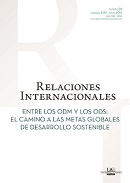Cooperation and conflict between Spanish Army and NGO: cultural and institutional factors in the international missions of Afghanistan, Lebanon and Kosovo
Keywords:
Peace operations , Armed Forces , NGO, legitimacy, cultural factorsCopyright (c) 2015 Marién DURÁN CENIT

This work is licensed under a Creative Commons Attribution-NonCommercial-NoDerivatives 4.0 International License.
Abstract
For two and a half decades, whenever Spain has got involved in international missions, the Spanish Armed Forces have established different relations with other actors operating in the same peace-keeping scenarios. Due to the frictions aroused between the parties, interactions between the army and NGOs have been subject of extensive attention. Drawing on this particular issue, this paper defends the hypothesis that cooperation and conflict between the Armed Forces and NGOs is conditioned by two fundamental factors: cultural issues and institutional features. As to the first group, we analyze the impact of organizational culture in this genre of interactions, while the effect of the mission’s legitimacy –particularly the mandate- is examined in reference to the second factor. The main conclusion to be drawn is that these two factors are at the heart of conflicting relationships between the Armed Forces and NGOs, and thus should receive special attention and evaluation from both sides for the sake of the proper development of their own missions, especially as refers to Afghanistan and Lebanon.





